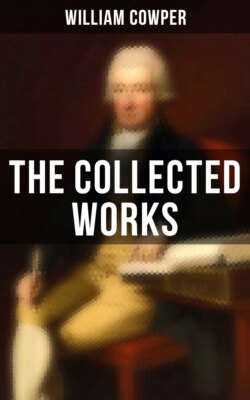Читать книгу The Collected Works - William Cowper - Страница 207
На сайте Литреса книга снята с продажи.
TO MRS. NEWTON.[160]
ОглавлениеTable of Contents
Olney, Nov. 23, 1782.
My dear Madam—Accept my thanks for the trouble you take in vending my poems, and still more for the interest you take in their success. My authorship is undoubtedly pleased, when I hear that they are approved either by the great or the small; but to be approved by the great, as Horace observed many years ago, is fame indeed. Having met with encouragement, I consequently wish to write again; but wishes are a very small part of the qualifications necessary for such a purpose. Many a man, who has succeeded tolerably well in his first attempt, has spoiled all by the second. But it just occurs to me that I told you so once before, and, if my memory had served me with the intelligence a minute sooner, I would not have repeated the observation now.
The winter sets in with great severity. The rigour of the season, and the advanced price of grain, are very threatening to the poor. It is well with those that can feed upon a promise, and wrap themselves up warm in the robe of salvation. A good fire-side and a well-spread table are but very indifferent substitutes for these better accommodations; so very indifferent, that I would gladly exchange them both for the rags and the unsatisfied hunger of the poorest creature that looks forward with hope to a better world, and weeps tears of joy in the midst of penury and distress. What a world is this! How mysteriously governed, and in appearance left to itself! One man, having squandered thousands at a gaming-table, finds it convenient to travel; gives his estate to somebody to manage for him; amuses himself a few years in France and Italy; returns, perhaps, wiser than he went, having acquired knowledge which, but for his follies, he would never have acquired; again makes a splendid figure at home, shines in the senate, governs his country as its minister, is admired for his abilities, and, if successful, adored at least by a party. When he dies he is praised as a demi-god, and his monument records every thing but his vices. The exact contrast of such a picture is to be found in many cottages at Olney. I have no need to describe them; you know the characters I mean. They love God, they trust him, they pray to him in secret, and, though he means to reward them openly, the day of recompence is delayed. In the meantime they suffer every thing that infirmity and poverty can inflict upon them. Who would suspect, that has not a spiritual eye to discern it, that the fine gentleman was one whom his Maker had in abhorrence, and the wretch last-mentioned dear to him as the apple of his eye! It is no wonder that the world, who are not in the secret, find themselves obliged, some of them, to doubt a Providence, and others absolutely to deny it, when almost all the real virtue there is in it is to be found living and dying in a state of neglected obscurity, and all the vices of others cannot exclude them from the privilege of worship and honour! But behind the curtain the matter is explained; very little, however, to the satisfaction of the great.
If you ask me why I have written thus, and to you especially, to whom there was no need to write thus, I can only reply, that, having a letter to write, and no news to communicate, I picked up the first subject I found, and pursued it as far as was convenient for my purpose.
Mr. Newton and I are of one mind on the subject of patriotism. Our dispute was no sooner begun than it ended. It would be well perhaps, if, when two disputants begin to engage, their friends would hurry each into a separate chaise, and order them to opposite points of the compass. Let one travel twenty miles east, the other, as many west; then let them write their opinions by the post. Much altercation and chafing of the spirit would be prevented; they would sooner come to a right understanding, and, running away from each other, would carry on the combat more judiciously, in exact proportion to the distance.
My love to that gentleman, if you please; and tell him that, like him, though I love my country, I hate its follies and its sins, and had rather see it scourged in mercy than judicially hardened by prosperity.
Yours, my dear Madam, as ever,
W. C.
